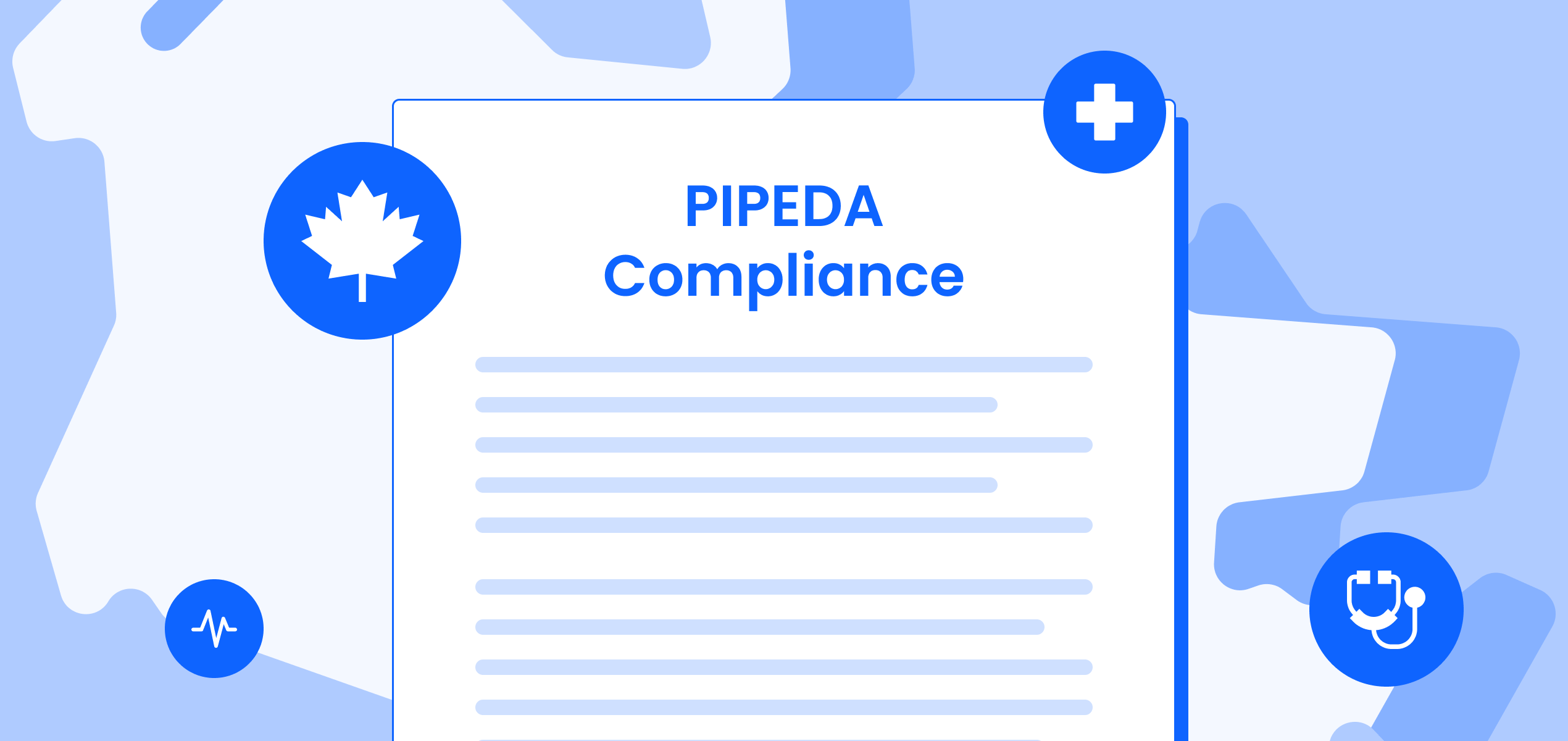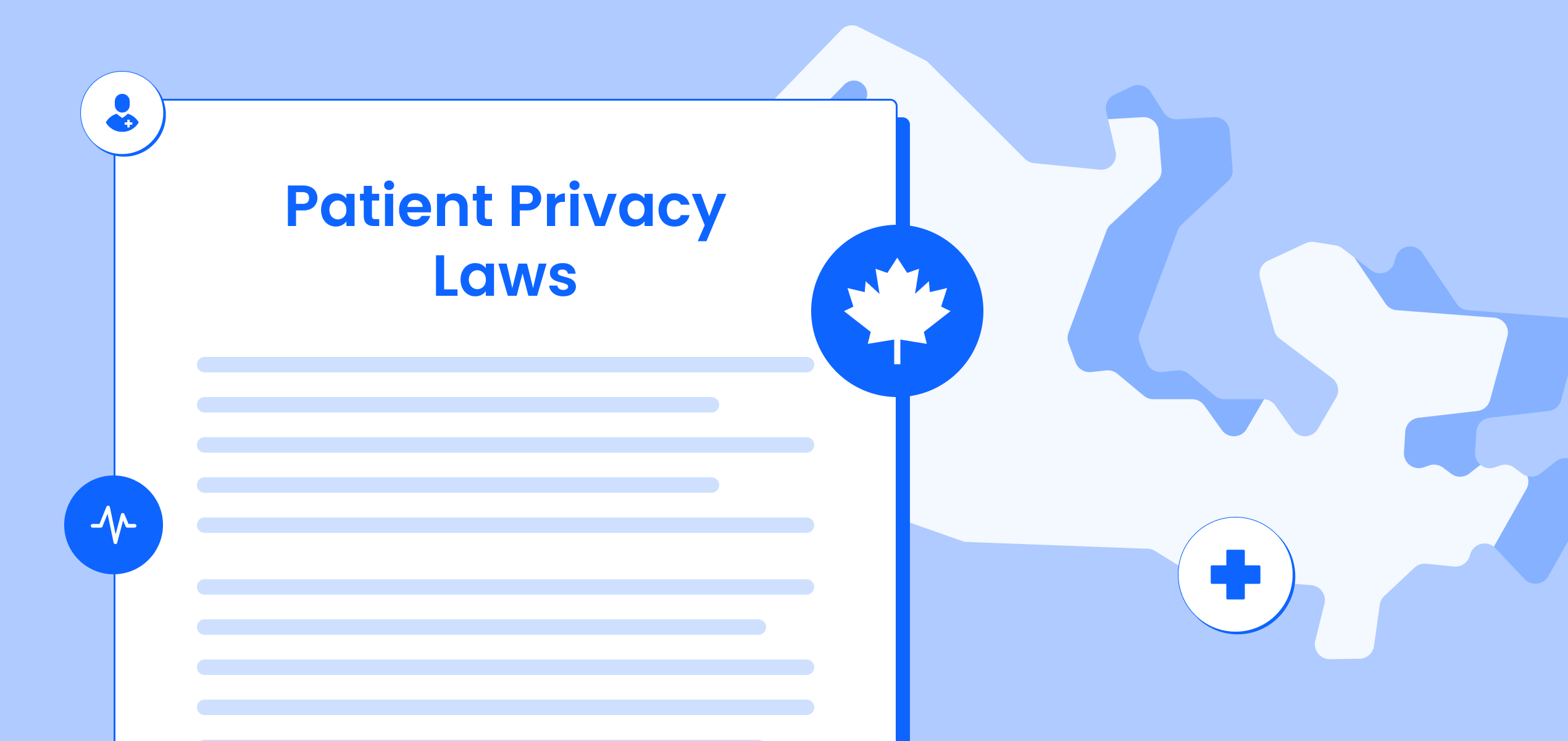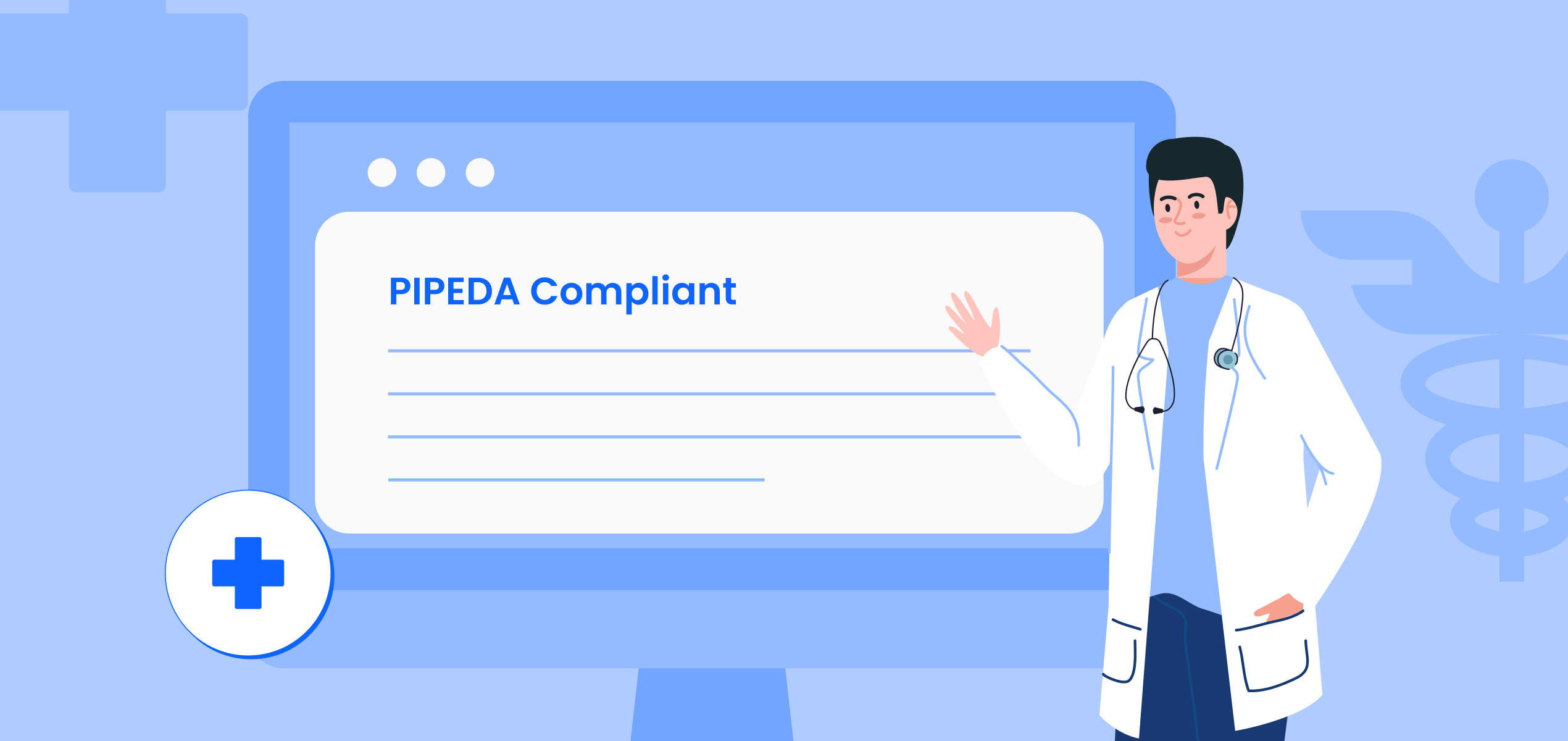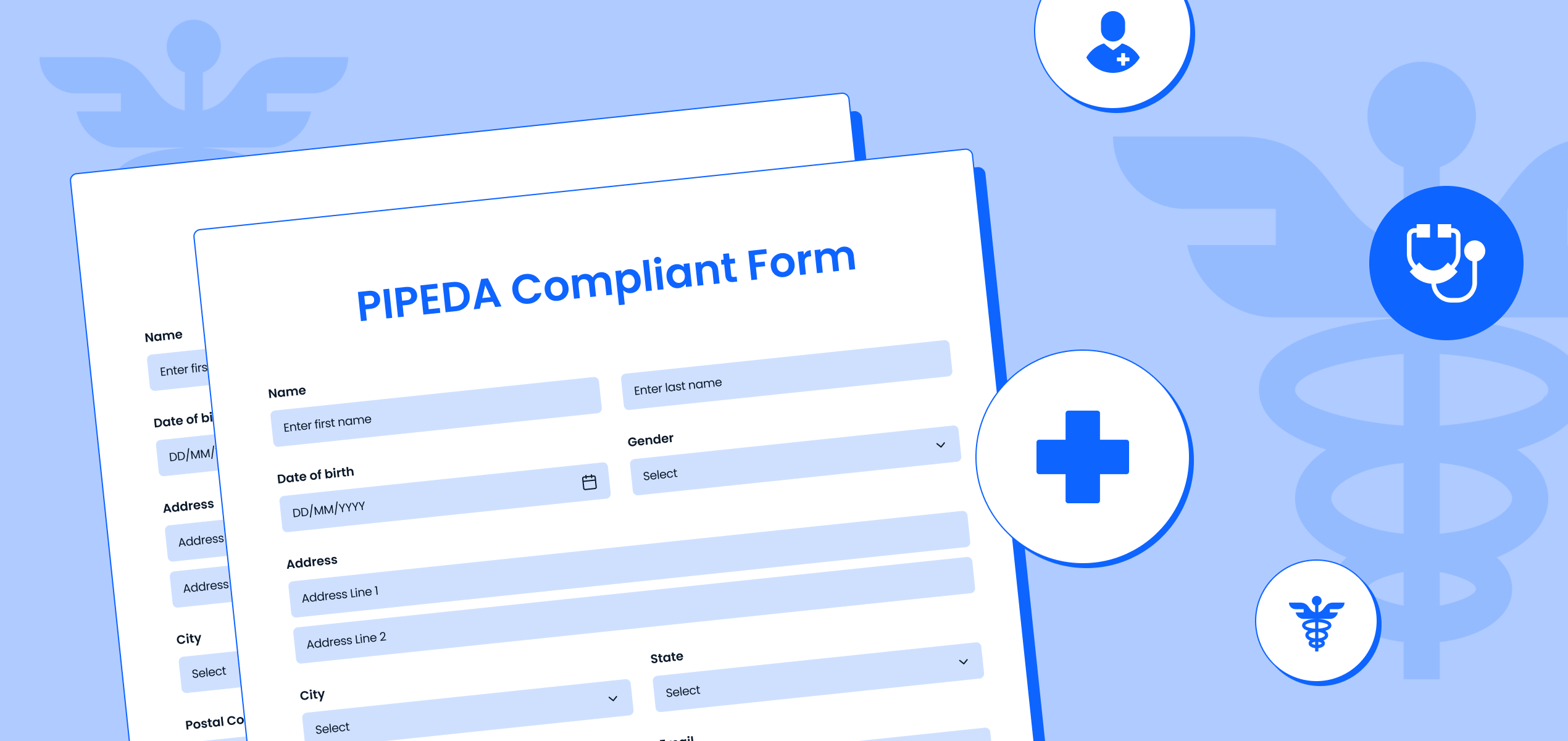Medical practitioners and institutions that are entrusted with the personal health information of patients have an ethical and legal responsibility to safeguard this data with the utmost diligence In Canada, PIPEDA serves as the guiding framework for the collection, use, and disclosure of personal information in the private sector, including healthcare organizations.
For medical practitioners in Canada, PIPEDA compliance is critical, as it sets clear standards for protection and handling of patients’ personal health information.
In this blog post, we delve into the intricacies of PIPEDA, dissecting its key principles, its applicability to medical practices, and the potential ramifications of non-compliance. We will also discuss the upcoming changes to Canada’s privacy landscape, including the proposed Consumer Privacy Protection Act (CPPA).
Let us begin by explaining what PIPEDA is.
What exactly is the PIPEDA compliance in Canada?
PIPEDA stands for Personal Information Protection and Electronic Documents Act. Enacted in 2000, the act came into full effect later in the year 2004. The act was formed to set the ground rules for how private-sector companies collect, use, and disclose personal information while conducting commercial activities across Canada.
Here’s a brief breakdown of ‘PIPEDA’:
- Personal Information: This refers to any data about an identifiable individual (Elaborated in the next section)
- Protection: The act aims to safeguard this personal information
- Electronic Documents: It also covers the use of electronic documents in commercial activities
- Act: A piece of legislation passed by the government of Canada
For medical practitioners, this act is particularly relevant as they handle sensitive personal health information on a daily basis.
But what exactly is personal health information and how does PIPEDA define it?
Let’s read on.
The definition of personal information under PIPEDA
Any information about an identifiable individual. PIPEDA;s definition of personal information includes, but is not limited to:
- Name, age, and address
- Medical records and health information
- Patient medical history
- Diagnostic information
- Treatment plans
- Prescription records
- Billing information
- Appointment schedules
Let us now take a deep dive into the ten principles PIPEDA is based on.
The 10 Key Principles of PIPEDA
PIPEDA is built on ten fair information principles that form the foundation of the law. Understanding these principles is crucial for Canadian medical practitioners to ensure compliance.
1. Accountability
Organizations are responsible for personal information under their control and must designate an individual to be accountable for compliance.
In a medical practice, this often means appointing a privacy officer who oversees all aspects of patient data management.
2. Identifying Purposes
The purposes for collecting personal information must be identified by the organization before or at the time of collection.
For medical practitioners, this involves clearly explaining to patients why specific information is being collected, such as for diagnosis, treatment, or billing purposes.
3. Consent
Knowledge and consent of the individual are required for the collection, use, or disclosure of personal information, except where inappropriate.
This principle requires obtaining informed consent from patients before collecting or sharing their health information, with exceptions for emergency situations.
4. Limiting Collection
The collection of personal information must be limited to that which is necessary for the purposes identified by the organization.
Medical practitioners should only collect information that is directly relevant to patient care or required by law, avoiding unnecessary data accumulation.
5. Limiting Use, Disclosure, and Retention
According to this principle of PIPEDA, personal information must not be used or disclosed for purposes other than those for which it was collected, except with the consent of the individual or as required by law.
Information should be retained only as long as necessary for the fulfillment of those purposes. This principle guides the secure disposal of patient records after the legally required retention period has passed.
6. Accuracy
The accuracy principle states that personal information must be as correct, complete, and up-to-date as is necessary for the purposes for which it is to be used.
Regular patient record reviews and updates are crucial in medical settings to ensure treatment decisions are based on current information.
7. Safeguards
Personal information must be protected by security safeguards appropriate to the sensitivity of the information.
For medical practices, this involves implementing robust cybersecurity measures and physical safeguards to protect patient data from unauthorized access or breaches.
8. Openness
An organization must make readily available to individuals specific information about its policies and practices relating to the management of personal information.
Medical practitioners should have clear, accessible privacy policies available for patients, often displayed in waiting areas or on practice websites.
9. Individual Access
Upon request, an individual must be informed of the existence, use, and disclosure of their personal information and be given access to that information. An individual shall be able to challenge the accuracy and completeness of the information and have it amended as appropriate.
This principle supports patients’ rights to view their medical records and request corrections if inaccuracies are found.
10. Challenging Compliance
An individual shall be able to address a challenge concerning compliance with the above principles to the designated individual or individuals accountable for the organization’s compliance.
Medical practices should have a clear process for patients to raise concerns about their data privacy and how those concerns will be addressed.
Now let us move on to understanding why PIPEDA was established in the first place.
What is the purpose of Canada’s PIPEDA for medical practitioners?
The purpose of PIPEDA’s establishment in Canada can be summarized as the following:
- To protect personal health information of patients in private healthcare
- To establish rules for collecting, using, and disclosing personal data
- To ensure patient privacy and confidentiality
- To require informed consent for data collection and use
- To mandate implementation of security measures
- To allow patients access to their own records
- To balance information sharing needs with privacy rights
Why are PIPEDA principles important for medical practitioners in Canada?
For medical practitioners, these principles translate into practical requirements such as obtaining informed consent from patients for the collection and use of their health information, implementing robust security measures to protect patient data, and ensuring patients can access their own medical records upon request.
Adhering to the principles of PIPEDA is vital for creating and maintaining the trust and confidence of patients. When patients have an understanding of how their personal information is being collected, used, and safeguarded, they feel more comfortable sharing sensitive health details, which in turn allows practitioners to provide more comprehensive and effective care.
Furthermore, following these guidelines helps medical practitioners navigate risks associated with data breaches, unauthorized access, or misuse of personal health information. Such incidents can have severe ramifications, including legal liabilities, financial penalties, and irreparable damage to the practice’s reputation and credibility.
This doesn’t just help medical practitioners fulfill their legal obligations but also demonstrates a commitment to ethical practices and a patient-centric approach. This commitment creates an environment of accountability, transparency, and respect for individual privacy rights.
Who is subject to follow and comply with PIPEDA?
In Canada, the Personal Information Protection and Electronic Documents Act (PIPEDA) applies to a wide range of organizations and individuals.
Compliance with PIPEDA is mandatory for:
1. Private sector organizations
Any business or organization that collects, uses, or discloses personal information in the course of commercial activities is subject to PIPEDA. This includes sole proprietorships, partnerships, and corporations.
2. Federal works, undertakings, and businesses
Organizations that are federally regulated, such as banks, telecommunications companies, and transportation companies that operate across provincial or international borders.
3. Health information custodians
While healthcare is primarily regulated at the provincial level, PIPEDA may apply to medical practitioners who engage in commercial activities that are not covered by provincial health privacy laws.
4. Interprovincial and international transactions
PIPEDA applies to the collection, use, and disclosure of personal information in the course of commercial activities that cross provincial or national borders.
It is crucial to understand that PIPEDA may not directly apply to certain healthcare activities and organizations. Following are the entities not covered under PIPEDA.
What are the entities not covered under PIPEDA?
There are multiple entities and situations where PIPEDA does not apply. Understanding these exceptions is crucial for Canadian medical practitioners. This will help ensure they’re adhering to the correct privacy regulations.
The following are generally not covered by PIPEDA:
1. Provincial and territorial governments
PIPEDA does not apply to provincial or territorial government organizations. These entities are typically subject to their own public sector privacy laws.
2. Municipalities
Local government bodies are not covered by PIPEDA. They usually fall under provincial or territorial jurisdiction.
3. Universities, schools, and hospitals
These institutions are generally regulated by provincial laws rather than PIPEDA, unless they engage in commercial activities outside their core functions.
4. Political parties and associations
These organizations are exempt from PIPEDA unless they engage in commercial activities unrelated to their political purposes.
5. Non-profit organizations and charities
Unless they engage in commercial activities that are not central to their mandate, these organizations are not subject to PIPEDA.
6. Personal use
Individuals collecting, using, or disclosing personal information for personal or domestic purposes are not covered by PIPEDA.
7. Journalistic, artistic, or literary purposes
The collection, use, or disclosure of personal information for these purposes is exempt from PIPEDA.
8. Businesses operating entirely within provinces with substantially similar privacy laws
Some provinces (currently Alberta, British Columbia, and Quebec) have their own private sector privacy laws that are considered substantially similar to PIPEDA. Organizations operating solely within these provinces are subject to the provincial law instead of PIPEDA.
The next question that comes to mind is about the repercussions one might have to face due to non compliance.
What Happens In Case of PIPEDA Non-compliance or Violation?
Violation or non-compliance with PIPEDA has serious consequences for entities. The governing body for the same is the Office of the Privacy Commissioner of Canada (OPC) and can take the following actions if found not complying:
1. Complaints and Investigations:
Individuals can file complaints with the OPC if they believe an organization has violated PIPEDA. The OPC can initiate investigations based on these complaints or on its own initiative. During an investigation, the OPC has the power to summon witnesses, compel testimony, and require the production of evidence.
2. Findings and Recommendations
After an investigation, the Privacy Commissioner issues a report of findings. This report includes recommendations for addressing any identified privacy issues. While these recommendations are not legally binding, they carry significant weight and are often implemented by organizations.
3. Mediation and Conciliation
The OPC may attempt to resolve complaints through mediation or conciliation before or during an investigation.
4. Federal Court Involvement
If an organization doesn’t follow the OPC’s recommendations, the complainant or the Privacy Commissioner can take the matter to the Federal Court. The Federal Court has the power to order an organization to correct its practices. The Court can award damages to the complainant, including compensation for humiliation.
5. Naming of Organizations
The Privacy Commissioner has the discretion to publicly name organizations that have committed privacy violations. This “naming and shaming” can result in significant reputational damage.
6. Financial Penalties
For certain violations, particularly those related to data breaches, organizations can face fines of up to $100,000 per violation.
7. Mandatory Breach Reporting
Organizations must report breaches of security safeguards involving personal information that pose a real risk of significant harm to individuals. Failure to report these breaches can result in fines of up to $100,000.
8. Audit Powers
The OPC has the authority to audit the personal information management practices of organizations if it has reasonable grounds to believe the organization is contravening PIPEDA.
What will replace the PIPEDA law in Canada?
For any economy to grow while leveraging data and digital technologies, trust is a key factor. To help Canadians take advantage of emerging technologies while helping them know their privacy is respected, the Canadian government has established the Digital Charter Implementation Act in 2022. This act which will be replacing PIPEDA, includes the proposed CPPA – Consumer Privacy Protection Act.
The CPPA would represent significant changes to the privacy laws in the private sector in Canada. It has also been established to raise the standard of privacy in the country and to provide businesses with a clear set of rules of dealing with personal information along with consequences for businesses that don’t comply.
Following is to be expected with the new Consumer Privacy Protection Act:
1. Improved control & consent
- Business will now have to provide information about personal information in plain and simple language. It will also enable Canadians to give meaning consent to businesses for utilization & disclosure of information.
- With data mobility, people also get more control over their data that equips them with the power of directing secure information transfer.
- For successful deletion of information, people can now withdraw consent with the right to disposal.
- Businesses will also have to leverage automated systems, like AI, for making predictions & decisions about Canadians.
Safeguarding information about children
- With CPPA, personal information of minors will now be taken as sensitive information
- To collect, use, & disclose this information, express consent would be required, with legal guardians & children having stronger privacy rights for disposal of this information.
Facilitating responsible innovation
- Better, clearer set of rules for de-identified data handling will be set for use in research and development.
- Organizations will be permitted to disclose de-identified data to public entities for socially advantageous initiatives. For e.g.: enhancement of public infrastructure, health, & environment.
Enhancing accountability and enforcement
- The CPPA will impose fines on non-compliance on companies not meeting compliance requirements.
- Penalty of up to $25 million or 5% of revenue, whichever is greater. In addition to that, an administrative monetary fine of $10 million or up to 3% of revenue will be charged.
With these rules and penalties being established, Canadians can expect an even better protection against their data being misused. These enhancements in data protection & rights for patient privacy not just ensures compliance but also upholds the ethical standards that are the cornerstone of the healthcare profession.
Conclusion
Understanding and implementing these privacy and compliance rules is not just about legal compliance. It is actually about fostering a culture of privacy and respect for patient information within your medical practice. This, in turn, builds trust with patients and enhances the overall quality of care provided and helps avoid potential legal consequences and reputational damage resulting from privacy violations.
As the privacy landscape in Canada continues to evolve with the anticipated implementation of the Consumer Privacy Protection Act, it is crucial for medical professionals to stay informed and adapt their practices accordingly.
Ultimately, PIPEDA serves as an imperative framework in Canada for responsible data handling, while enabling medical practitioners to leverage the power of personal health information. Embracing this commitment to privacy strengthens the patient-healthcare provider relationship and enhances the overall quality of care.
FAQs
PIPEDA is Canada’s Personal Information Protection and Electronic Documents Act. This act sets rules for how private-sector organizations collect, use, and disclose personal information.
PIPEDA is based on 10 principles, which are:
- Accountability
- Identifying Purposes
- Consent
- Limiting Collection
- Limiting Use/Disclosure/Retention
- Accuracy
- Safeguards
- Openness
- Individual Access
- Challenging Compliance.
Private sector organizations, health information custodians engaging in commercial activities, and federally regulated businesses across Canada must comply with PIPEDA.
The Consumer Privacy Protection Act (CPPA), which is a part of the Digital Charter Implementation Act 2022, is proposed to replace PIPEDA.
PIPEDA-compliance violations result in investigations, public naming of organizations, fines up to $100,000 per violation, and potential Federal Court orders to correct practices.



